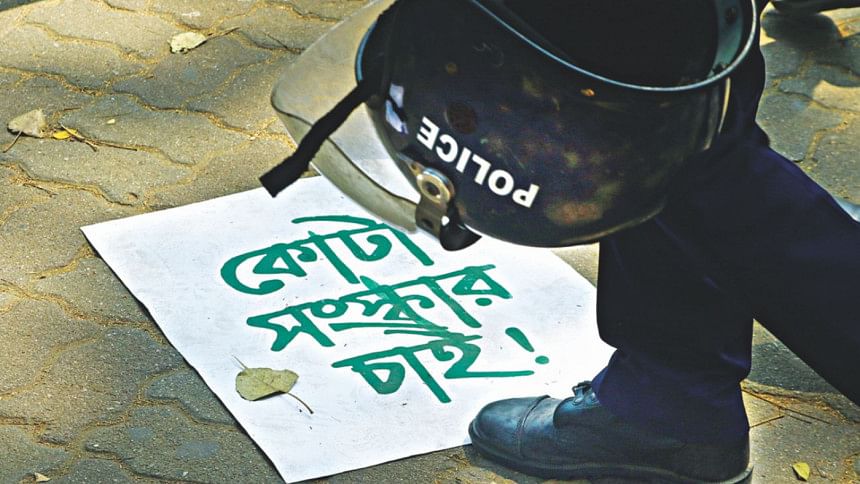No merit in quotas

Anyone who has played "alley cricket" will know that it has its own rules: e.g. two "chiefs" get to select players in tandem, and (s)he who sends the ball over the wall must fetch it. Another such rule is that the owner of the bat will have an automatic place on the team. This last provision is an everyday example of a "quota system" where able performers are replaced by those wielding power over the selection process.
Quotaism is the organising of society through a quota system, whether by racial, gender, language or other demographic attributes. A "quota system" is a way of artificially regulating sub-group representation. It is as ancient as in-group favouritism, and variously employed by authorities to regulate and manipulate group representation.
Often quotas are used to increase representation, e.g. Union Councils in Bangladesh have three reserved positions for women leaders. Certain missionary-run schools and colleges ensure quotas based on religious affiliations. New Zealand has parliamentary quotas for the indigenous Maori people. In India, acid attack victims have recently become eligible for quota-protected central government jobs. Such enforced quotas can help achieve equitable socio-politico-economic outcomes for societies.
But "increased representation" is not always the best idea. In 1909, the British East India Company enacted separate electorates for Hindus and Muslims, thereby ensuring a healthy quota for Muslim leaders. Good news, right?
Wrong.
As history shows, this sowed the seeds of eternal discord between two communities that had lived side by side for millennia, and arguably expedited the communal and secessionist politics that followed.
Nearly a hundred years later, US-led forces in Iraq were using the same scheme. In the name of "bringing democracy", the invading coalition conjured a "governing council" to fill the void created by regime toppling. They designed the council to be divided into sectarian and ethnic quotas. This move further institutionalised ethno-sectarian divides and contributed to one of the bloodiest episodes of sectarian violence of the century.
Quotas are also used to keep "undesirable" representation at a minimum. For example, in the aftermath of WWI, Yale University's ethnic quota formula was thus: "never admit more than five Jews, take only two Italian Catholics, and take no blacks at all."
Let us take away three key lessons from here: Quota systems often require distinct, identifiable sub-groups whose representation they are to regulate. Secondly, state actors can enact uplifting or oppressive measures against underrepresented sub-groups. In the process, they may also deliver a certain measure of privilege to particular social groups. Lastly, because "quotas" are (seemingly) arbitrary constraints upon an existing system, they are only as beneficial as their underlying motive.
***
When, in 2013, students gathered to protest Bangladesh's significant government jobs quota reserved for various groups, they faced stiff opposition from law enforcement agencies. The protesters were dispersed and driven away from the very space occupied by the Shahbag Movement the same year.
The fact that the Shahbag Movement enjoyed police protection while the anti-quota protests were tear-gassed seems to suggest that law enforcement agencies had a problem not with the mode of protest, but the issue at the core.
This year, new activists have surfaced. The anti-quota protesters want not to abolish, but to reform the quota system that reserves 56 percent of government jobs through 258 types of quotas. Experts, including former PSC leaders, have argued that decreasing the percentage of quotas will actually help nurture a more meritocratic bureaucracy.
Naturally, this is seen as an affront by the few who enjoy the privileges of such quotas. Of them, Muktijoddha Sangsad Santan Command (children of freedom fighters, eligible for 30 percent government jobs) has been quite vocal. According to their president, "It's a conspiracy. It's Jamaat-Shibir activists who have been staging demonstration demanding reformation of the quota system under the banner of the general students."
It is important to note that neither camp, in principle, opposes the 1972 Executive Order that promulgated the freedom fighters' quota in the first place. It is the indefinite "continuation" of the system which is being questioned.
Let us first establish that how any nation recruits its public officials is of paramount importance. It has lasting impact on policymaking, civil administration public service delivery, development work and everything else that shapes the future of modern nations. In that sense, it is far from being "a movement against the incumbent government," as quota-beneficiaries were quoted as saying. If anything, it is a movement to complement the current government's modernisation and democratisation efforts.
Let us, therefore, eliminate infantile name-calling and trolling from this all-important debate.
The High Court has ruled that this matter is a "policy decision of the government," i.e. not a sub judice or constitutional matter per se. Therefore, it should be open for discussion. To facilitate reasoned, civil debate around this issue, we may refer back to the framework presented earlier: Who is/are the sub-group? What is their disadvantage? What role do the "quotas" fulfill? What is the macroeconomic cost of foregoing a merit-based system in 2018?
No rational soul can deny Bangabandhu Sheikh Mujibur Rahman's magnanimity and keen foresight in instituting a quota system for our freedom fighters. Those involved in the armed struggle were especially disadvantaged—having sacrificed studies, income, jobs, limbs and lives for the motherland.
However, one can question whether—nearly half a century later—the same level of disadvantage still remains. It is, after all, possible and admissible to evaluate "quotas" as a socioeconomic tool or intervention, right? If the level of disadvantage is unchanged (or higher) for beneficiaries, then the quota system hasn't been an effective intervention. And if the level of disadvantage has decreased, then the privileges should be revisited, and if needed, channelled to more deserving quarters.
Former cabinet secretary (head of the civil service) Dr Akbar Ali Khan has reflected: [the quota system intended to] "elevate the poor, not to award anyone." That sure sounds like a vision forged in the flames of a bloodied, war-torn nation. Yet, the quota-reform activists have been labelled "traitors", "subversives", and 800 of them have been sued by law enforcement agencies. If all the quota-reform activists and their supporters are asking is that due consideration be given to this system of privilege that comes at the cost of meritocracy, then there is merit there. And I, for one, would support a quota reserved for such public-policy debates.
Adnan R Amin is a strategy and communications consultant.





Comments